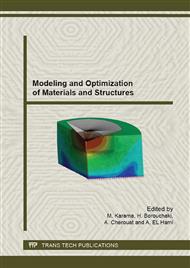p.61
p.71
p.80
p.87
p.94
p.102
p.110
p.120
p.129
Reliability Based Design Optimization Framework for Boat Propeller
Abstract:
The need for improvements in engineering designs especially for coupled structures is nowadays becoming a major industry request. Today there is a desire to perform optimizations in order to receive optimal system properties. However, for computationally expensive simulation models, an optimization may be too tedious to be motivated. Deterministic approaches are unable to take into account all the variability’s that characterize design input properties without leading to oversized structures. The objectives of this work are to quantify the influence of material and operational uncertainties on the performance of structures coupled with fluid, and to develop a reliability-based design and optimization methodology for this type of the structures. Such a problem requires a very high computation cost, which is mainly due to the calculation of gradients, especially when a finite element model is used. To simplify the optimization problem and to find at least a local optimum solution, a new method based on semi-numerical solution is proposed in this paper. The results demonstrate the viability of the proposed reliability-based design and optimization methodology relative to the classical methods, and demonstrate that a probabilistic approach is more appropriate than a deterministic approach for the design and optimization of structures coupled with fluid
Info:
Periodical:
Pages:
94-101
DOI:
Citation:
Online since:
April 2015
Authors:
Price:
Сopyright:
© 2015 Trans Tech Publications Ltd. All Rights Reserved
Share:
Citation:


